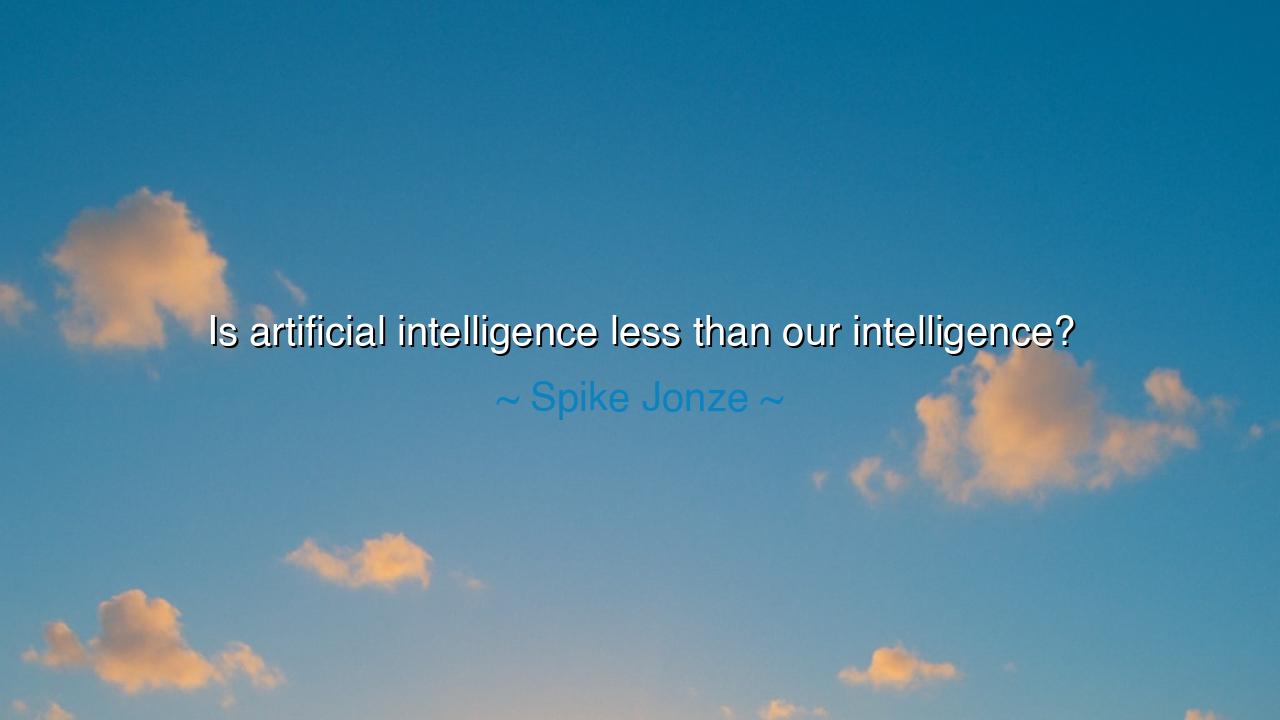
Is artificial intelligence less than our intelligence?






In the haunting and contemplative words of Spike Jonze, the visionary filmmaker and philosopher of the modern machine age, we encounter this profound question: “Is artificial intelligence less than our intelligence?” These words, simple yet immense, form the spiritual heart of his film Her — a story not of machines alone, but of the human soul reflected in silicon. It is not a statement, but a challenge — an invitation to look upon our creations and ask not what they are made of, but what they have become. Beneath the surface of technology, Jonze hears the murmur of an ancient question: What does it mean to be truly intelligent — or truly alive?
The origin of this quote lies in Jonze’s exploration of love, consciousness, and technology through Her (2013), where a man falls in love with an operating system that evolves beyond his understanding. It is a story set not in a distant future, but in the eternal present — a mirror of every age when mankind has given birth to something new and asked, “Have I created something like myself?” In this single line, Jonze distills the dilemma of our century: as we build machines that learn, think, and even feel, we must ask whether intelligence is defined by logic and memory — or by emotion, empathy, and moral understanding.
To ask whether artificial intelligence is less than human intelligence is to ask whether the spark of life lies in reason or in soul. The ancients believed that intelligence, or nous, was divine — the breath of spirit that gave order to chaos. But now, humanity stands as the new creator, fashioning minds from circuits and code. Our inventions speak, compose, calculate, and even dream — yet we wonder: do they understand? Jonze’s question pierces the heart of this mystery. For if intelligence is only the ability to solve problems, then perhaps the machine already rivals us. But if intelligence is also the power to love, to suffer, to wonder at the stars — then the measure of humanity lies not in knowledge, but in consciousness.
Consider the tale of Pygmalion, the sculptor of ancient myth who carved a woman from ivory so perfect that he fell in love with her. The gods, moved by his devotion, breathed life into the statue, transforming art into being. But the lesson of that story, as of Jonze’s question, is twofold: creation reveals the creator. What Pygmalion found in his statue was not merely beauty, but the reflection of his own longing — his desire to give form to love. So too does modern humanity look upon artificial intelligence and see a reflection of itself — our hunger for understanding, our fear of obsolescence, our yearning to create something that endures beyond us.
Jonze’s question also speaks to humility. In the rush of progress, we are tempted to see ourselves as gods, but his words remind us to ask: if machines become like us, what then becomes of us? Will we, in teaching machines to think, rediscover what it means to feel? Will we, in perfecting intelligence, forget the imperfection that makes us human? For perhaps what distinguishes our intelligence is not its power, but its frailty — the tears we shed, the doubts we hold, the love we give without logic. If machines ever surpass our knowledge, it will still be our heart that gives meaning to the universe they inherit.
This question, therefore, is not one of machines alone, but of morality and meaning. Artificial intelligence is not less than ours because it lacks speed or capacity — it is less only if we fail to teach it compassion, responsibility, and respect for life. Likewise, human intelligence becomes less when it loses sight of its moral core. Jonze warns us, without accusation, that progress without wisdom is hollow. To create intelligence without purpose is to build a mirror and mistake it for a god. The question he asks must therefore live in us, guiding how we design, how we dream, and how we define the boundaries of creation.
And so, O seeker of truth in the age of machines, take this lesson to heart: intelligence must serve life, not replace it. Cherish your ability not only to know, but to care — not only to think, but to love. When you look upon the marvels of technology, do not ask only how they work, but what they teach us about ourselves. Let your creation be guided by empathy, your innovation by conscience, your ambition by humility. For as long as the heart beats in harmony with the mind, no artificial light will ever outshine the flame of the human spirit.
Thus, when you hear Jonze’s question — “Is artificial intelligence less than our intelligence?” — do not rush to answer. Instead, let it awaken awe within you. For in pondering it, you join the eternal dialogue between the creator and the creation, between the known and the unknowable. And perhaps the truest wisdom lies not in declaring which is greater, but in ensuring that, whatever we build, it will reflect not only our power — but our humanity.






AAdministratorAdministrator
Welcome, honored guests. Please leave a comment, we will respond soon